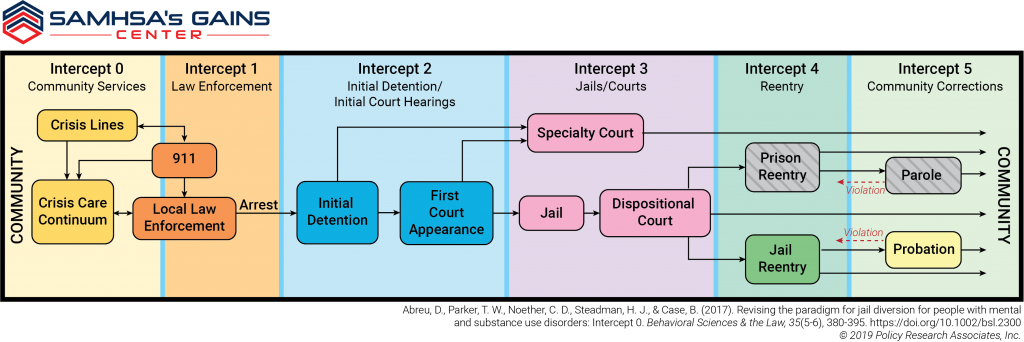Leah Pope, PhD, Senior Research Fellow, Vera Institute of Justice
David Shern, PhD, Senior Public Health Advisor, National Association of State Mental Health Program Directors
This article is part of a three-part series on how the criminal justice system can play a role in shortening the duration of untreated psychosis for people with mental illness who have become justice involved through the lens of the Sequential Intercept Model. Part one examines Intercepts 0 – 1. Part two examines Intercepts 2 – 3. Part three examines Intercepts 4 – 5.
The National Institute of Mental Health Recovery After an Initial Schizophrenia Episode (RAISE) project demonstrated the effectiveness of coordinated specialty care (CSC) programs for serving persons with a first episode of psychosis (FEP). Based on the RAISE project’s positive results, the U.S. Congress added new funds to the mental health block grant in 2014, with further increased funding in 2016. These funds have been used throughout the country to develop CSC programs that primarily serve individuals with FEP. A list of these programs is available at the Substance Abuse and Mental Health Services Administration’s early serious mental illness program locator. Linkages between CSC programs and the community partners who are likely to encounter persons with FEP are critical to the program’s success. The criminal justice system has multiple important linkage points.
One of the key findings from the RAISE study involved the duration of untreated psychosis (DUP). The shorter this duration, the better the outcomes that persons with FEP experienced. It is critical that CSC programs have an effective referral network that includes all of the settings in which FEP may occur. The criminal justice system has multiple settings where staff personnel may encounter persons experiencing FEP. Using the Sequential Intercept Model, we have discussed reducing DUP at intercepts 0-1 and 2-3 in previous GAINS’ newsletter articles. Here we will focus on intercepts 4 and 5.
Intercepts 4 and 5 involve the release of individuals from detention and linkage to appropriate community resources. For persons with FEP who are detained, best practices involve screening and assessment followed by recovery-oriented, proactive planning to link individuals to CSC programs upon release. In-reach from CSC program staff, when appropriate, can help begin the engagement process and increase the likelihood of linkage upon release. Since the timing of release may be unpredictable, rapid planning and linkage from the jail are essential.
Intercept 5 involves linkage to community corrections by the CSC program. People on probation or parole can be screened and/or community corrections officers can take advantage of information gained at earlier intercepts to help determine the appropriateness of CSC programming for individuals and facilitate linkage to a CSC program. It can be especially helpful to educate community corrections officers on the signs and symptoms of early-onset psychosis, through Mental Health First Aid or Crisis Intervention Team training, for example, since they routinely see people at risk for the development of psychosis.
Criminal justice agencies and CSC programs share common goals regarding early detection and effective intervention for individuals with FEP. When the treatment and criminal justice systems are effectively collaborating, individuals with early onset psychosis can be diverted from incarceration to treatment or successfully linked to treatment upon release. The Sequential Intercept Model illustrates that multiple opportunities exist for detection, diversion, and effective linkage. Reducing the time between the onset of psychosis and the receipt of effective services will improve client outcomes and reduce their long-term involvement with the criminal justice system.
For individuals who would like additional information regarding CSC programs and the criminal justice system, SAMHSA’s GAINS Center is sponsoring a webinar on June 18, 2019, from 2:00-3:30 p.m. ET, the Role of the Criminal Justice System in Reducing the Duration of Untreated Psychosis.



